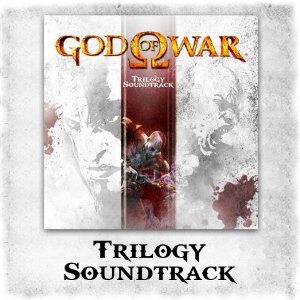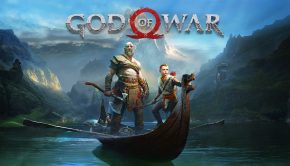God of War Trilogy Soundtrack
 |
Album Title: God of War Trilogy Soundtrack |
| Record Label: Sony Computer Entertainment |
|
| Catalog No.: N/A |
|
| Release Date: March 17, 2010 |
|
| Purchase: Buy Used Copy |
Overview
Released as part of the God of War III Ultimate Trilogy Edition the God of War Trilogy Soundtrack is a compilation album of the three main soundtracks from the series. This set features music from the series’ resident composers Gerard Marino, Mike Reagan, Ron Fish, and Cris Velasco, as well as God of War guest Winifred Philips and God of War III contributor Jeff Rona. This set of orchestral scores is certainly stunning, and comes as a great addition to any die-hard fan’s collection, but sadly isn’t available for purchase outside of the God of War III Ultimate Trilogy Edition. In that respect, hopefully this review will guide you into which album from the series to buy.
Body
The first disc features music from the God of War Soundtrack, the first score for the series. Though the production values are weaker than subsequent instalments in the franchise, the music still provides a strong starting point for the following scores in the series and is quite impressive all these years later. First up, Gerard Marino’s tracks use some very hard-hitting instrumentation to create an aggressive soundscape. Two of Marino’s tracks which really stick out are the creatively developed “Kratos and the Sea” and “The Story of Chronos”. However, it’s “The Vengeful Spartan” that really defines the series’ trademark sound with its unforgettable rhythms and rhythms.
Despite the use of orchestral motifs being apparent throughout the soundtrack, the composers seem to have fortunately avoided producing a never ending dullness of tracks, as may have otherwise been expected. Rather, their collective musical knowhow makes way for a large number of well-developed orchestral themes, with a noticeable creative use of ancient and ethnic instrumentation. Mike Reagan and Ron Fish create similarly powerful sounds too, but focus more on ethnic instrumentation rather than melodic exploration. Two tracks worth listening to are Mike Reagan’s “Mind the Cyclops” and Ron Fish’s “Pandoran Cyclopes Attack.” Mind the Cyclops” features some chilling instrumentation, with a low threatening choir being its best part, whereas “Pandoran Cyclopes Attack” is one of the disc’s more surprising themes with its fast paced drum line and constant orchestral hits.
Though Reagan and Marino contribute the most themes to the disc, their fellow composers each have a couple of impacting tracks, and earn their place. Though each theme on the disc is orchestral, each composer utilises their main strength to create a good selection of diverse themes. Cris Velasco’s contributions for example, are of the more melodic variety, and of course this is where his strengths lie too. His three themes, “Zeus’ Wrath Divine,” “Hades God of the Underworld” and “Minotaur Boss Battle”, are each well melodically developed and well-produced, with the latter perhaps being the most striking and memorable in and out of context. Winifred Philips too creates a few melodic gems, but mostly relies on ambience in her compositions. “Exploring the Ruins” and “The Underwater World of Poseidon” are her two strongest themes, mostly due to the mysterious vibe that they emanate.
Following the accomplished God of War Soundtrack the God of War II Official Soundtrack is represented on the second disc. Gerard Marino’s hard-hitting aggressive orchestrations get us underway with “God of War II – Main Titles,” an awe-inspiring balance of strength and melody. He also contributes a few fast paced bass-centred tracks in the form of “The End Begins,” “Crossing the Lowlands,” and “Colossus of Rhodes,” akin to what can be heard in the first soundtrack. “The End Begins”, in particular, has proven to be one of the most iconic tracks from the score and builds on the series’ signature sound wonderfully. He does surprise us though with his fantastically developed “The Way of the Gods” which contains one of this disc’s most gripping melodies and string-choir interactions.
Once more we are graced with a wide variety of ominous orchestral pieces on God of War II, but the difference this time is that each composer seems a little more distinctive. Velasco has created more impacting tones and evolved with this selection of powerful themes, the most notable of which is “The Isle of Creation”; with one of the album’s strongest melodies played on strings and followed by a dangerous brass section, the track is an amazing adventure. A composer who does surprise us is Ron Fish, who seems to have adopted Winifred Phillips’ ambient style with his ominous contributions. “The Summit of Sacrifice” is a good example of this, with its quaint flute and guitar introduction, before leading us into an ominous section led by brass. “Atlas” is by far my favourite composition from Fish, with its creative use of strings, silence, oboe, and reverberation.
Unlike Fish, Mike Reagan’s style doesn’t seem to have taken upon any different characteristics to his God of War contributions, just except he no longer relies on ethnic instrumentation. Although this removes distinctive character from his tracks, and makes them sound much like Marino’s themes, it does allow Reagan to further develop upon his orchestral motifs. “Battle for the Skies” and “The Glory of Sparta” are his best, and are actually better than his earlier work, simply because he introduces some musical clarity. Overall, God of War II a strong soundtrack, and comes in at a par with the first. By the sounds of it, this group of composers certainly seem to be heading somewhere, and this can be further assessed, just by looking at the next disc.
The last disc presents us with the music from the God of War III Original Soundtrack, which once more features music from Marino, Fish, Reagan, and Velasco, but also with three themes from newcomer Jeff Rona. Boasting orchestral recordings at the Skywalker Ranch and choral recordings at the Rudolfinum, the soundtrack has even more impressive production values than the predecessor. Gerard Marino once more contributes the most tracks, in his typical aggressive and powerful orchestral style; among them, reprises of the series’ main theme in the stunning title theme. The good thing though, is that Marino also seems to integrate a couple of stunning melodies within his themes, most notably in the fast-paced “Poseidon’s Wrath” and the ambient “Revenge Falling.” The latter can be best described as a musical rollercoaster, and one without any safety rails either.
Mike Reagan’s contributions to the soundtrack almost seem pitifully few in comparison to Marino’s, with just four new themes featuring on the album. It is “In the Face of Fear” though which I find to be his most compelling track. The bold, aggressive manner stemming from this theme coupled with Reagan’s strongest melody results in a powerful musical blend, with the emphasis placed on creating that ever so important ominous aura. Ron Fish, too, is just as successful, and seems to dabble with both ambient and power-driven themes. “The Lost Souls” is probably the best of his ambient tracks, but he really succeeds “The March of Tartarus,” with its lavish string development and rising sequences. It is Cris Velasco once more though who comes out as the king of melodies, though. Velasco’s “Pandora’s Song” is arguably the best track on this disc, with its success stemming from the carefully crafted coming together of all instruments involved in the main melody. It’s stunningly beautiful in context too.
Considering the origins of the music for this series, it is interesting to note that composers such as actually come a long way, despite not really changing so much in style. However, there is one newcomer here. Jeff Rona also has a similarly small contribution to the soundtrack as Reagan, but these are certainly impacting and imaginative. “Lure of a Goddess” is his most inspiring and unique composition, using ethnic instrumentation to create some fascinating imagery. The melody is this track’s strong point, and it almost seems to guide itself, weaving in and out of Rona’s sturdy accompaniment. With each composer providing consistently powerful tracks, decent melodies, and hard-hitting backdrops, it’s hard to find a flaw at all. It’s clear that each composer has realised their strengths by this stage, and so they have successfully created themes in which these strengths are focused upon.
Summary
The God of War Trilogy Soundtrack is certainly the best way to experience the series’ musical development, and allows the listener to see how the composers have developed over time. With the more recent God of War III Original Soundtrack featuring the best music in the series — and the God of War Soundtrack featuring the weakest despite its imagination — it’s pretty obvious that there’s a case of natural progression going on in the series. You’ll find it hard to get your hands on this set of discs, but you will have three more soundtracks in your game music collection for your efforts.
Do you agree with the review and score? Let us know in the comments below!
4
Posted on June 2, 2010 by Dave Valentine. Last modified on September 2, 2014.













